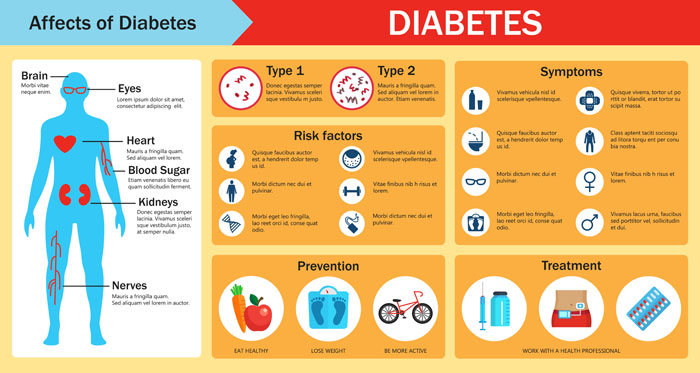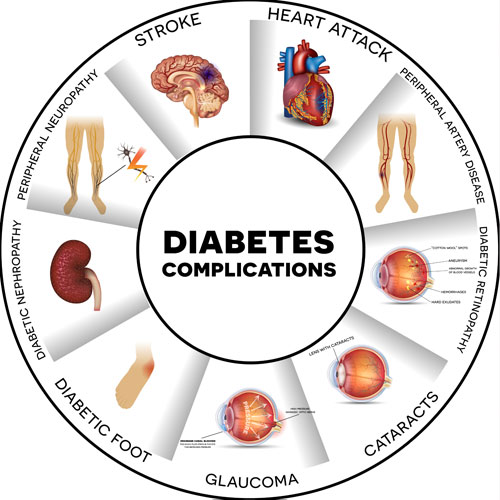India has an estimated 77 million adults with diabetes, a number that is expected to rise to 101 million by 2030. An estimated 20-30% of senior citizens are affected by the disease, writes Dr Girish Parmar
 India is rapidly emerging as the diabetes capital of the world, owing to a combination of factors such as sedentary lifestyles, unhealthy dietary habits, and genetic predisposition. According to the International Diabetes Federation, the country had an estimated 77 million adults with diabetes, a number that is expected to rise to 101 million by 2030.
India is rapidly emerging as the diabetes capital of the world, owing to a combination of factors such as sedentary lifestyles, unhealthy dietary habits, and genetic predisposition. According to the International Diabetes Federation, the country had an estimated 77 million adults with diabetes, a number that is expected to rise to 101 million by 2030.
An estimated 20-30% senior citizens of India, are affected by the disease. Declining efficiency of the body to process glucose, chronic co-morbidities, poor diet, lack of exercise etc. is making seniors more vulnerable to developing diabetes. Additionally, diabetes can have a significant impact on the health of senior citizens, leading to various serious health complications such as cardiovascular disease, kidney disease, nerve damage, vision problems, cognitive decline, and increased risk of infections. Therefore, it is crucial to raise awareness about diabetes and its management among senior citizens in India to prevent or delay the onset of complications and improve their overall health outcomes.
What is diabetes:
Diabetes is a condition in which the body is unable to properly regulate blood sugar levels. There are two main types of diabetes: type 1 and type 2. Type 1 diabetes is usually diagnosed in children and young adults and is caused by the body’s immune system attacking the cells in the pancreas that produce insulin. Type 2 diabetes is more common in adults and occurs when the body becomes resistant to insulin, or when the pancreas is not able to produce enough insulin to regulate blood sugar levels properly.
Risk factors:
Several factors increase the risk of developing diabetes as we age, including:
- Family history of diabetes: If one or more family members have diabetes, the risk of developing the condition is two to three times more than those without a family history of diabetes.
- Overweight or obesity: Excess weight, particularly in the abdominal area, is associated with insulin resistance, which impairs the body’s ability to use insulin effectively to regulate blood sugar levels.
- Physical inactivity: Lack of physical activity can lead to weight gain and increase the risk of developing diabetes.
- Hypertension or High blood pressure: High blood pressure can increase the risk of developing Type 2 diabetes by causing insulin resistance and damaging the blood vessels in the pancreas.
- High Cholesterol levels: Elevated cholesterol levels can lead to the accumulation of plaque in the arteries, narrowing them and restricting blood flow. When the artery leading to the pancreas is affected, it may impair insulin production, increasing the risk of developing diabetes.
- Smoking: The harmful chemicals in tobacco smoke can damage cells and tissues, leading to insulin resistance and an increased risk of developing diabetes.
- Poor diet: A diet high in processed foods, saturated fats, and sugary drinks can increase the risk of developing diabetes.

Impact of diabetes on seniors:
Diabetes can have a significant impact on seniors’ health and quality of life. Over time, high blood sugar levels can damage blood vessels, nerves, and organs, leading to a range of complications, including:
- Heart disease and stroke: Diabetes can increase the risk of heart disease and stroke by damaging the blood vessels and making them more prone to blockages, leading to reduced blood flow and increased risk of clots.
- Kidney disease: High blood sugar levels can damage the tiny blood vessels in the kidneys, leading to reduced kidney function and an increased risk of kidney disease.
- Vision problems and blindness: Diabetes can cause damage to the blood vessels in the retina, leading to vision problems and blindness.
- Nerve damage and numbness in the feet and hands: High blood sugar levels can damage the nerves, leading to numbness, tingling, and other nerve-related symptoms in the feet and hands.
- Wound healing problems and infections: High blood sugar levels can impair the body’s ability to fight infections and slow down the healing process, leading to increased risk of infections and delayed wound healing.
- Increased risk of infections: Diabetes can weaken the immune system, making it harder for the body to fight off infections, leading to an increased risk of various infections, such as skin infections, gum infections, and urinary tract infections.

Benefits of early diagnosis and treatment:
Early detection and treatment of diabetes are essential to prevent or delay the onset of complications and improve overall health outcomes. Seniors who are diagnosed with diabetes can work with their doctors to develop a treatment plan that includes lifestyle changes, such as a healthy diet, regular physical activity, and quitting smoking, as well as medication to help regulate blood sugar levels.
Tips for early detection and prevention
Seniors can take several steps to reduce their risk of developing diabetes, including:
- Maintaining a healthy weight: A healthy weight can help regulate blood sugar levels and reduce the risk of developing diabetes.
- Eating a balanced diet: A diet that is high in fibre, low in processed foods and saturated fats, and includes plenty of fruits and vegetables can help regulate blood sugar levels and reduce the risk of developing diabetes.
- Engaging in regular physical activity: Regular physical activity, such as walking or swimming, can help regulate blood sugar levels and reduce the risk of developing diabetes.
- Getting regular check-ups: Seniors should get regular check-ups with their doctor to monitor their blood sugar levels and identify any potential health problems early on.
- Quitting smoking: Smoking increases the risk of developing diabetes and other health problems, so seniors should quit smoking to reduce their risk.
Newest treatments for diabetes:
In recent years, several new treatments have become available to help manage diabetes, including:
- Continuous glucose monitoring systems: These devices can provide real-time information about blood sugar levels and help seniors adjust their diet, medication, and physical activity to keep blood sugar levels in the target range.
- Insulin pumps: Insulin pumps deliver insulin continuously, eliminating the need for multiple injections throughout the day.
- New medications: Several new medications have been developed to help regulate blood sugar levels and reduce the risk of complications.
In conclusion, diabetes is a common and serious health condition that affects many seniors. While there is no cure for diabetes, early detection and treatment can help prevent or delay the onset of complications and improve overall health outcomes. Seniors can reduce their risk of developing diabetes by maintaining a healthy weight, eating a balanced diet, engaging in regular physical activity, getting regular check-ups, and quitting smoking. With the latest treatments available, seniors can effectively manage their diabetes and maintain good health and quality of life.
Dr Girish Parmar is Senior Consultant, Endocrinology and Diabetology at the Nanavati Max Super Speciality Hospital, Mumbai








